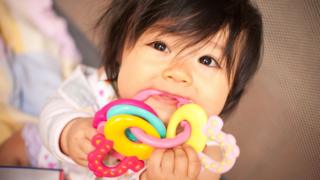
Image copyright
Getty Images
Teething gels for infants that contain an anaesthetic will no longer be sold in supermarkets and high street shops.
Those containing lidocaine – used in many of the gels – will only be sold in pharmacies from 2019.
It follows a review by the medicines regulator that found they were linked with a “very small” risk of harm and there is little evidence they work.
Parents have been advised to massage the gums or use a teething ring before trying the gels.
‘Normal process’
The guidance comes from the Medicines and Healthcare products Regulatory Agency (MHRA), which said instructions about using the gels and safety warnings for them should also be updated.
It said gels containing lidocaine should only be used as a second line of treatment following discussions with a healthcare professional.
Dr Sarah Branch, from the the MHRA, said: “Our review showed there is a lack of evidence of benefit to using teething gels.
“To help babies and children with teething, parents and caregivers should try non-medicine options such as rubbing or massaging the gums or a teething ring.
“We want to make sure you get the right information about teething.
“If your child continues to have problems with teething, talk to your pharmacist or healthcare professional about the best options.”
Dr Cheryll Adams, executive director of the Institute of Health Visiting, said “teething was a normal process”.
She added: “Parents should talk to their health visitors if they are concerned that their baby is overly distressed but their first action should be to offer the baby a cold teething ring or similar to bite on to relieve their discomfort and/or to massage the baby’s gums with a clean finger.
“If this isn’t effective and the baby is persistently distressed, then they can speak to a pharmacist, who may feel that it’s appropriate to offer a pharmaceutical treatment.”



